Business Ethics: MF Global Case Study Analysis and Discussion
VerifiedAdded on 2020/03/15
|8
|1997
|45
Case Study
AI Summary
This case study analyzes the ethical and managerial failures within the MF Global case. It examines the actions of key personnel, including Corzine and O'Brien, and assesses their adherence to legal and ethical standards. The analysis explores issues such as abuse of power, the ethical implications of financial decisions, and the responsibilities of ethics and compliance officers. The study references ethical theories like utilitarianism and virtue ethics to evaluate the actions taken. The case concludes with a discussion of whether the actions constituted criminal negligence and highlights the importance of ethical conduct within a company. The analysis emphasizes the importance of ethical decision-making and the consequences of unethical behavior, especially within financial contexts. This case study provides insights into the complexities of ethical dilemmas and managerial responsibilities in the business world.

Paraphrase This Document
Need a fresh take? Get an instant paraphrase of this document with our AI Paraphraser
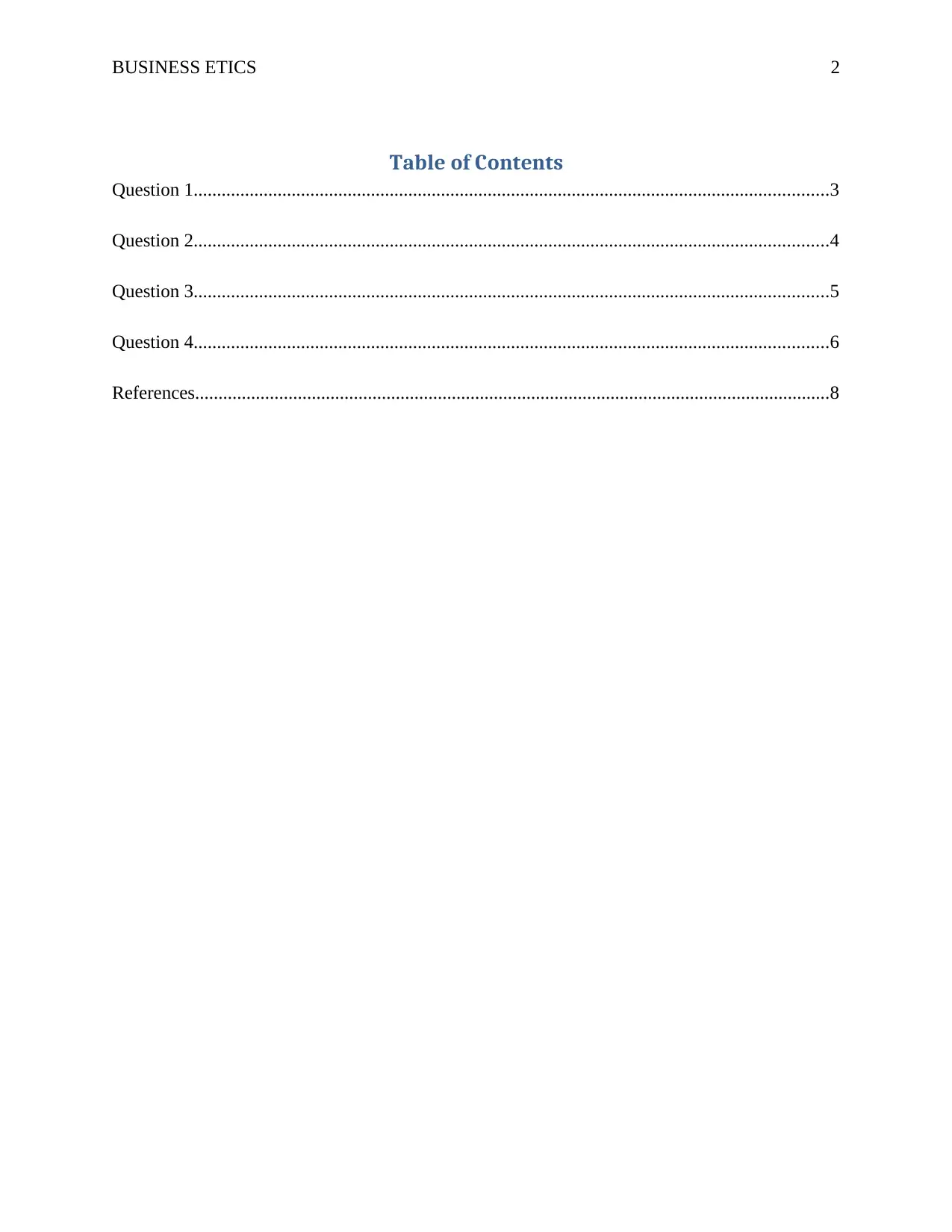
BUSINESS ETICS 2
Table of Contents
Question 1........................................................................................................................................3
Question 2........................................................................................................................................4
Question 3........................................................................................................................................5
Question 4........................................................................................................................................6
References........................................................................................................................................8
Table of Contents
Question 1........................................................................................................................................3
Question 2........................................................................................................................................4
Question 3........................................................................................................................................5
Question 4........................................................................................................................................6
References........................................................................................................................................8
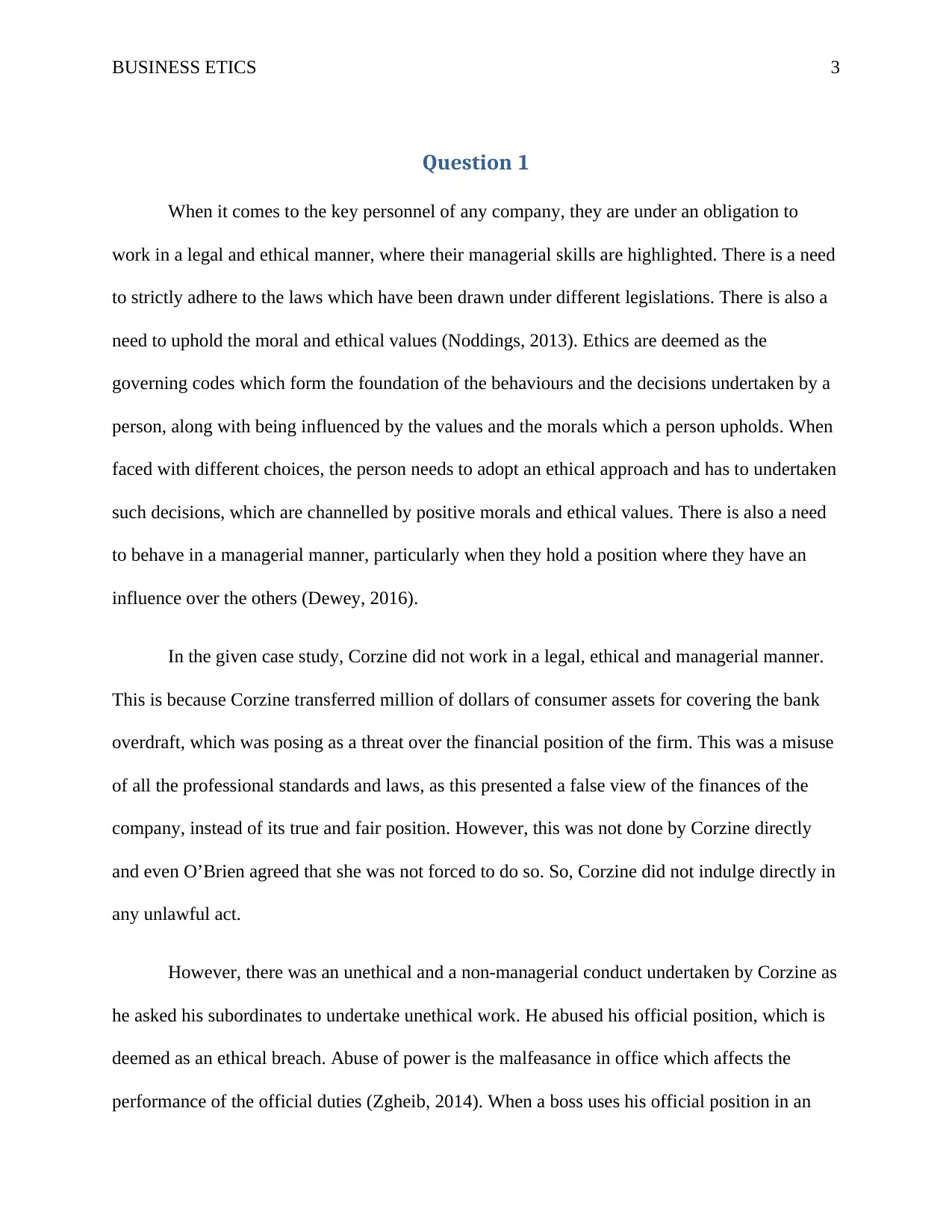
BUSINESS ETICS 3
Question 1
When it comes to the key personnel of any company, they are under an obligation to
work in a legal and ethical manner, where their managerial skills are highlighted. There is a need
to strictly adhere to the laws which have been drawn under different legislations. There is also a
need to uphold the moral and ethical values (Noddings, 2013). Ethics are deemed as the
governing codes which form the foundation of the behaviours and the decisions undertaken by a
person, along with being influenced by the values and the morals which a person upholds. When
faced with different choices, the person needs to adopt an ethical approach and has to undertaken
such decisions, which are channelled by positive morals and ethical values. There is also a need
to behave in a managerial manner, particularly when they hold a position where they have an
influence over the others (Dewey, 2016).
In the given case study, Corzine did not work in a legal, ethical and managerial manner.
This is because Corzine transferred million of dollars of consumer assets for covering the bank
overdraft, which was posing as a threat over the financial position of the firm. This was a misuse
of all the professional standards and laws, as this presented a false view of the finances of the
company, instead of its true and fair position. However, this was not done by Corzine directly
and even O’Brien agreed that she was not forced to do so. So, Corzine did not indulge directly in
any unlawful act.
However, there was an unethical and a non-managerial conduct undertaken by Corzine as
he asked his subordinates to undertake unethical work. He abused his official position, which is
deemed as an ethical breach. Abuse of power is the malfeasance in office which affects the
performance of the official duties (Zgheib, 2014). When a boss uses his official position in an
Question 1
When it comes to the key personnel of any company, they are under an obligation to
work in a legal and ethical manner, where their managerial skills are highlighted. There is a need
to strictly adhere to the laws which have been drawn under different legislations. There is also a
need to uphold the moral and ethical values (Noddings, 2013). Ethics are deemed as the
governing codes which form the foundation of the behaviours and the decisions undertaken by a
person, along with being influenced by the values and the morals which a person upholds. When
faced with different choices, the person needs to adopt an ethical approach and has to undertaken
such decisions, which are channelled by positive morals and ethical values. There is also a need
to behave in a managerial manner, particularly when they hold a position where they have an
influence over the others (Dewey, 2016).
In the given case study, Corzine did not work in a legal, ethical and managerial manner.
This is because Corzine transferred million of dollars of consumer assets for covering the bank
overdraft, which was posing as a threat over the financial position of the firm. This was a misuse
of all the professional standards and laws, as this presented a false view of the finances of the
company, instead of its true and fair position. However, this was not done by Corzine directly
and even O’Brien agreed that she was not forced to do so. So, Corzine did not indulge directly in
any unlawful act.
However, there was an unethical and a non-managerial conduct undertaken by Corzine as
he asked his subordinates to undertake unethical work. He abused his official position, which is
deemed as an ethical breach. Abuse of power is the malfeasance in office which affects the
performance of the official duties (Zgheib, 2014). When a boss uses his official position in an
⊘ This is a preview!⊘
Do you want full access?
Subscribe today to unlock all pages.

Trusted by 1+ million students worldwide
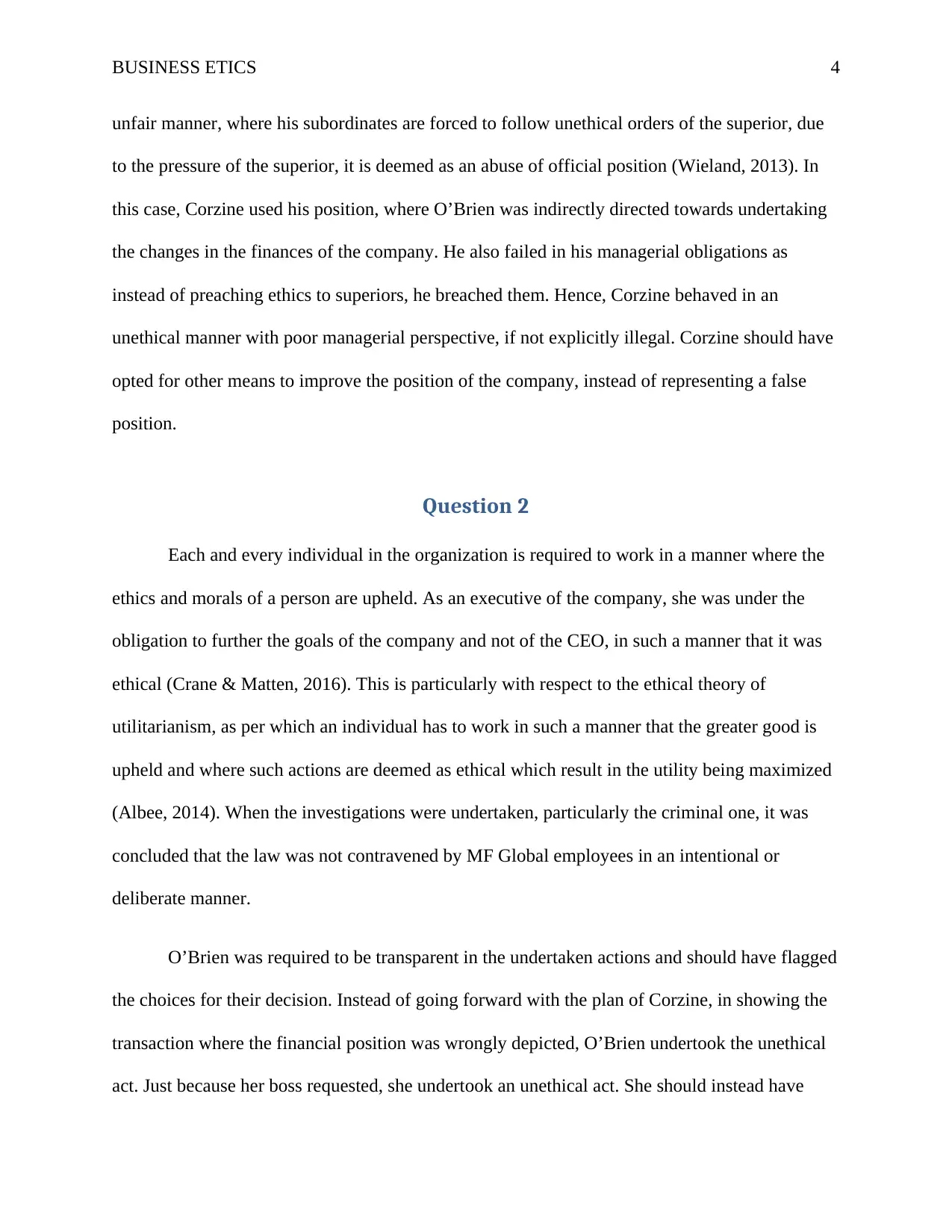
BUSINESS ETICS 4
unfair manner, where his subordinates are forced to follow unethical orders of the superior, due
to the pressure of the superior, it is deemed as an abuse of official position (Wieland, 2013). In
this case, Corzine used his position, where O’Brien was indirectly directed towards undertaking
the changes in the finances of the company. He also failed in his managerial obligations as
instead of preaching ethics to superiors, he breached them. Hence, Corzine behaved in an
unethical manner with poor managerial perspective, if not explicitly illegal. Corzine should have
opted for other means to improve the position of the company, instead of representing a false
position.
Question 2
Each and every individual in the organization is required to work in a manner where the
ethics and morals of a person are upheld. As an executive of the company, she was under the
obligation to further the goals of the company and not of the CEO, in such a manner that it was
ethical (Crane & Matten, 2016). This is particularly with respect to the ethical theory of
utilitarianism, as per which an individual has to work in such a manner that the greater good is
upheld and where such actions are deemed as ethical which result in the utility being maximized
(Albee, 2014). When the investigations were undertaken, particularly the criminal one, it was
concluded that the law was not contravened by MF Global employees in an intentional or
deliberate manner.
O’Brien was required to be transparent in the undertaken actions and should have flagged
the choices for their decision. Instead of going forward with the plan of Corzine, in showing the
transaction where the financial position was wrongly depicted, O’Brien undertook the unethical
act. Just because her boss requested, she undertook an unethical act. She should instead have
unfair manner, where his subordinates are forced to follow unethical orders of the superior, due
to the pressure of the superior, it is deemed as an abuse of official position (Wieland, 2013). In
this case, Corzine used his position, where O’Brien was indirectly directed towards undertaking
the changes in the finances of the company. He also failed in his managerial obligations as
instead of preaching ethics to superiors, he breached them. Hence, Corzine behaved in an
unethical manner with poor managerial perspective, if not explicitly illegal. Corzine should have
opted for other means to improve the position of the company, instead of representing a false
position.
Question 2
Each and every individual in the organization is required to work in a manner where the
ethics and morals of a person are upheld. As an executive of the company, she was under the
obligation to further the goals of the company and not of the CEO, in such a manner that it was
ethical (Crane & Matten, 2016). This is particularly with respect to the ethical theory of
utilitarianism, as per which an individual has to work in such a manner that the greater good is
upheld and where such actions are deemed as ethical which result in the utility being maximized
(Albee, 2014). When the investigations were undertaken, particularly the criminal one, it was
concluded that the law was not contravened by MF Global employees in an intentional or
deliberate manner.
O’Brien was required to be transparent in the undertaken actions and should have flagged
the choices for their decision. Instead of going forward with the plan of Corzine, in showing the
transaction where the financial position was wrongly depicted, O’Brien undertook the unethical
act. Just because her boss requested, she undertook an unethical act. She should instead have
Paraphrase This Document
Need a fresh take? Get an instant paraphrase of this document with our AI Paraphraser
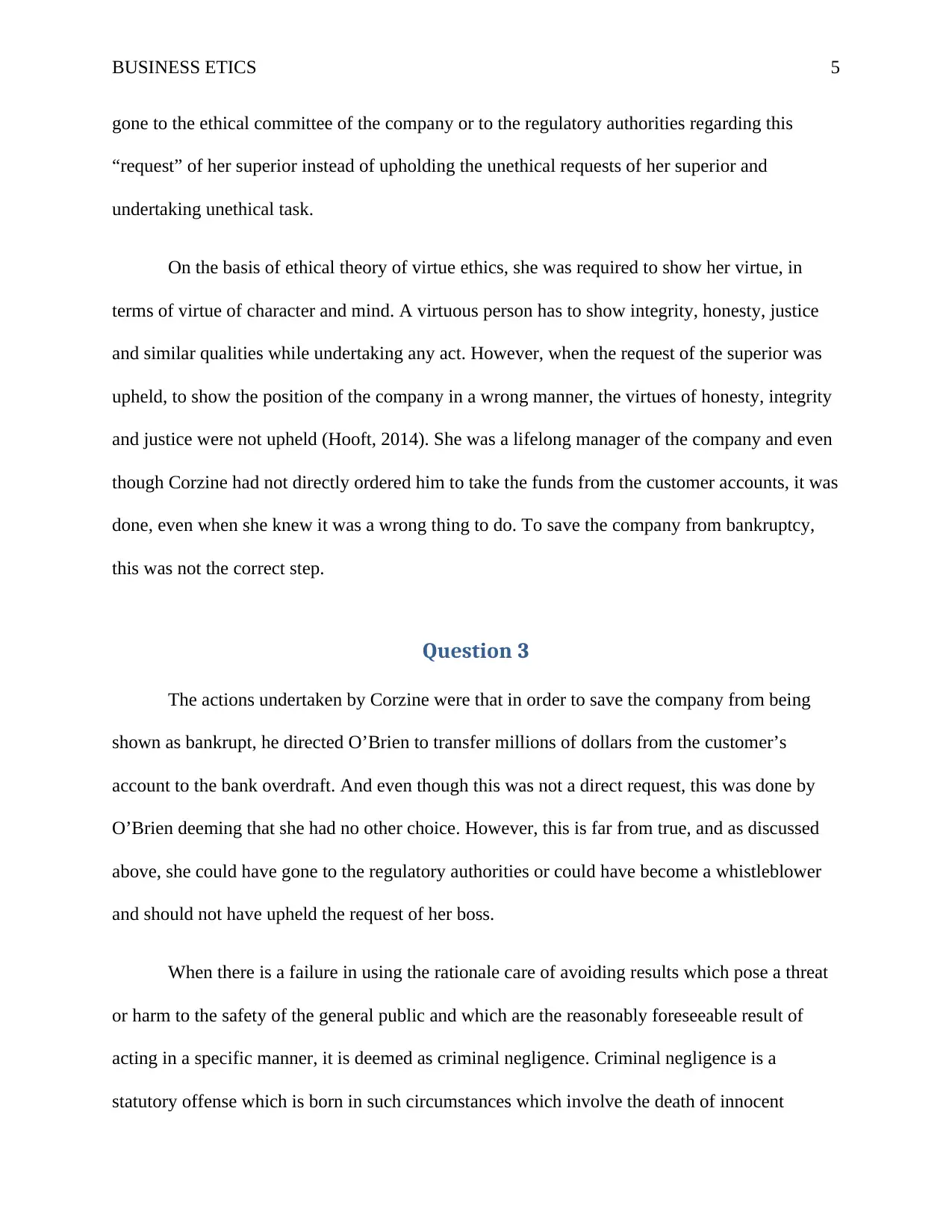
BUSINESS ETICS 5
gone to the ethical committee of the company or to the regulatory authorities regarding this
“request” of her superior instead of upholding the unethical requests of her superior and
undertaking unethical task.
On the basis of ethical theory of virtue ethics, she was required to show her virtue, in
terms of virtue of character and mind. A virtuous person has to show integrity, honesty, justice
and similar qualities while undertaking any act. However, when the request of the superior was
upheld, to show the position of the company in a wrong manner, the virtues of honesty, integrity
and justice were not upheld (Hooft, 2014). She was a lifelong manager of the company and even
though Corzine had not directly ordered him to take the funds from the customer accounts, it was
done, even when she knew it was a wrong thing to do. To save the company from bankruptcy,
this was not the correct step.
Question 3
The actions undertaken by Corzine were that in order to save the company from being
shown as bankrupt, he directed O’Brien to transfer millions of dollars from the customer’s
account to the bank overdraft. And even though this was not a direct request, this was done by
O’Brien deeming that she had no other choice. However, this is far from true, and as discussed
above, she could have gone to the regulatory authorities or could have become a whistleblower
and should not have upheld the request of her boss.
When there is a failure in using the rationale care of avoiding results which pose a threat
or harm to the safety of the general public and which are the reasonably foreseeable result of
acting in a specific manner, it is deemed as criminal negligence. Criminal negligence is a
statutory offense which is born in such circumstances which involve the death of innocent
gone to the ethical committee of the company or to the regulatory authorities regarding this
“request” of her superior instead of upholding the unethical requests of her superior and
undertaking unethical task.
On the basis of ethical theory of virtue ethics, she was required to show her virtue, in
terms of virtue of character and mind. A virtuous person has to show integrity, honesty, justice
and similar qualities while undertaking any act. However, when the request of the superior was
upheld, to show the position of the company in a wrong manner, the virtues of honesty, integrity
and justice were not upheld (Hooft, 2014). She was a lifelong manager of the company and even
though Corzine had not directly ordered him to take the funds from the customer accounts, it was
done, even when she knew it was a wrong thing to do. To save the company from bankruptcy,
this was not the correct step.
Question 3
The actions undertaken by Corzine were that in order to save the company from being
shown as bankrupt, he directed O’Brien to transfer millions of dollars from the customer’s
account to the bank overdraft. And even though this was not a direct request, this was done by
O’Brien deeming that she had no other choice. However, this is far from true, and as discussed
above, she could have gone to the regulatory authorities or could have become a whistleblower
and should not have upheld the request of her boss.
When there is a failure in using the rationale care of avoiding results which pose a threat
or harm to the safety of the general public and which are the reasonably foreseeable result of
acting in a specific manner, it is deemed as criminal negligence. Criminal negligence is a
statutory offense which is born in such circumstances which involve the death of innocent
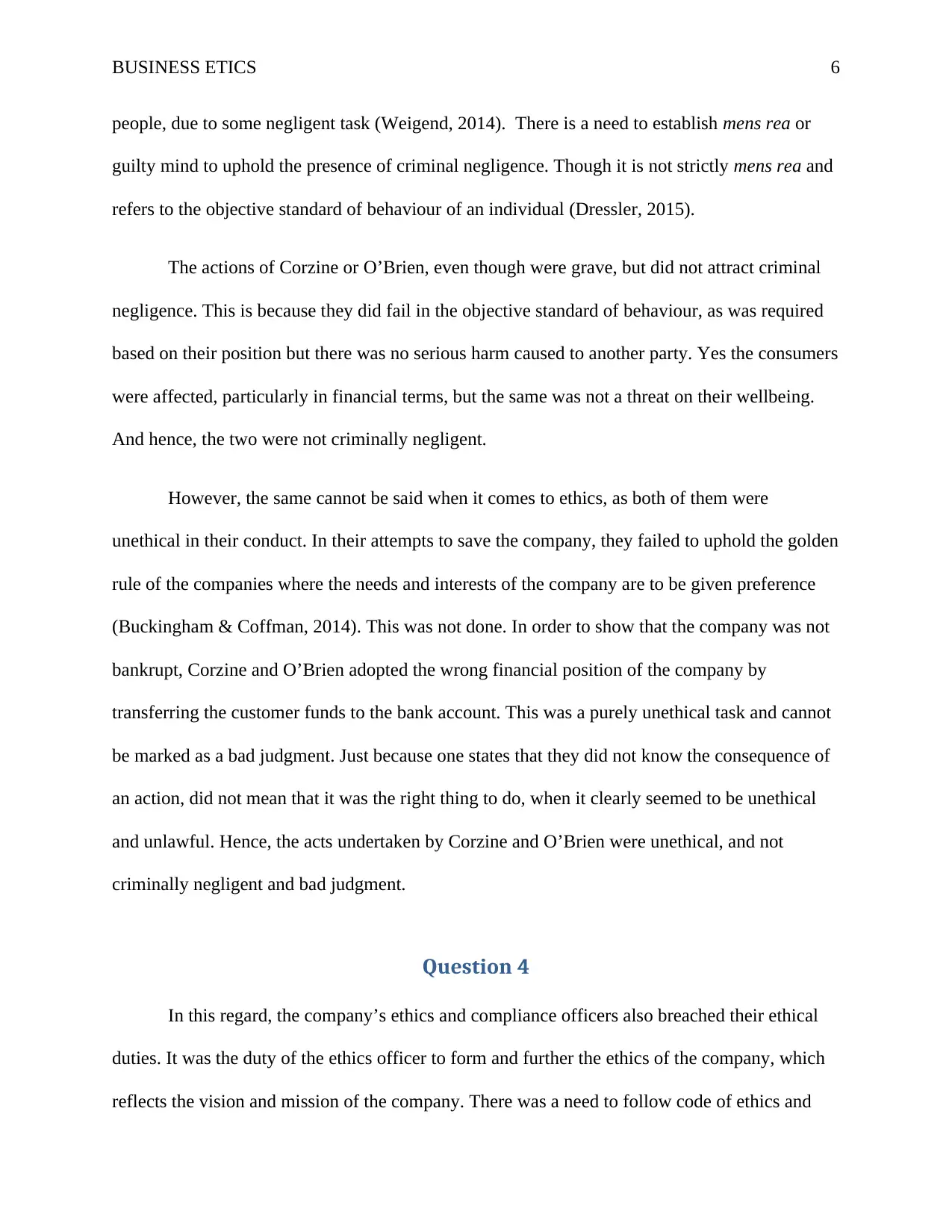
BUSINESS ETICS 6
people, due to some negligent task (Weigend, 2014). There is a need to establish mens rea or
guilty mind to uphold the presence of criminal negligence. Though it is not strictly mens rea and
refers to the objective standard of behaviour of an individual (Dressler, 2015).
The actions of Corzine or O’Brien, even though were grave, but did not attract criminal
negligence. This is because they did fail in the objective standard of behaviour, as was required
based on their position but there was no serious harm caused to another party. Yes the consumers
were affected, particularly in financial terms, but the same was not a threat on their wellbeing.
And hence, the two were not criminally negligent.
However, the same cannot be said when it comes to ethics, as both of them were
unethical in their conduct. In their attempts to save the company, they failed to uphold the golden
rule of the companies where the needs and interests of the company are to be given preference
(Buckingham & Coffman, 2014). This was not done. In order to show that the company was not
bankrupt, Corzine and O’Brien adopted the wrong financial position of the company by
transferring the customer funds to the bank account. This was a purely unethical task and cannot
be marked as a bad judgment. Just because one states that they did not know the consequence of
an action, did not mean that it was the right thing to do, when it clearly seemed to be unethical
and unlawful. Hence, the acts undertaken by Corzine and O’Brien were unethical, and not
criminally negligent and bad judgment.
Question 4
In this regard, the company’s ethics and compliance officers also breached their ethical
duties. It was the duty of the ethics officer to form and further the ethics of the company, which
reflects the vision and mission of the company. There was a need to follow code of ethics and
people, due to some negligent task (Weigend, 2014). There is a need to establish mens rea or
guilty mind to uphold the presence of criminal negligence. Though it is not strictly mens rea and
refers to the objective standard of behaviour of an individual (Dressler, 2015).
The actions of Corzine or O’Brien, even though were grave, but did not attract criminal
negligence. This is because they did fail in the objective standard of behaviour, as was required
based on their position but there was no serious harm caused to another party. Yes the consumers
were affected, particularly in financial terms, but the same was not a threat on their wellbeing.
And hence, the two were not criminally negligent.
However, the same cannot be said when it comes to ethics, as both of them were
unethical in their conduct. In their attempts to save the company, they failed to uphold the golden
rule of the companies where the needs and interests of the company are to be given preference
(Buckingham & Coffman, 2014). This was not done. In order to show that the company was not
bankrupt, Corzine and O’Brien adopted the wrong financial position of the company by
transferring the customer funds to the bank account. This was a purely unethical task and cannot
be marked as a bad judgment. Just because one states that they did not know the consequence of
an action, did not mean that it was the right thing to do, when it clearly seemed to be unethical
and unlawful. Hence, the acts undertaken by Corzine and O’Brien were unethical, and not
criminally negligent and bad judgment.
Question 4
In this regard, the company’s ethics and compliance officers also breached their ethical
duties. It was the duty of the ethics officer to form and further the ethics of the company, which
reflects the vision and mission of the company. There was a need to follow code of ethics and
⊘ This is a preview!⊘
Do you want full access?
Subscribe today to unlock all pages.

Trusted by 1+ million students worldwide
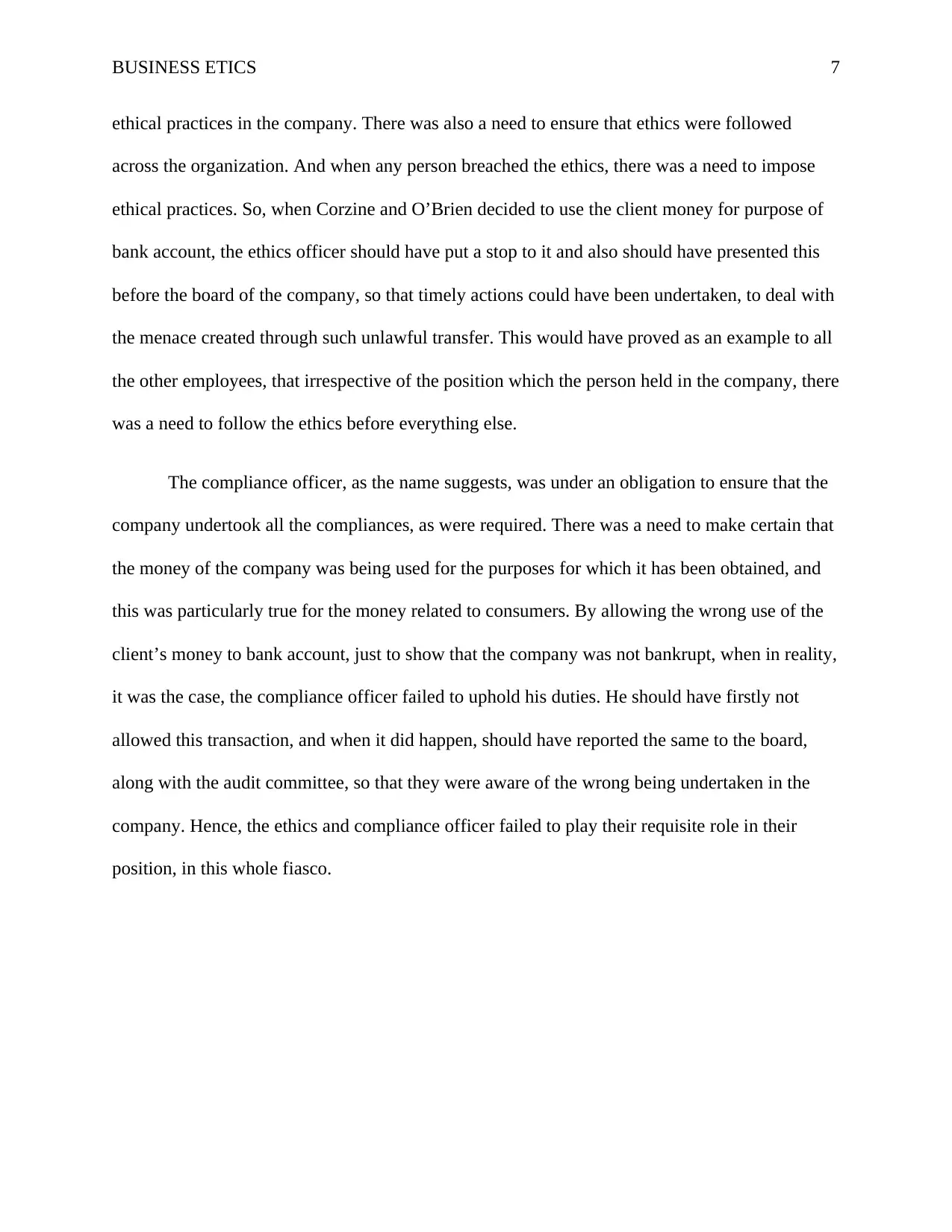
BUSINESS ETICS 7
ethical practices in the company. There was also a need to ensure that ethics were followed
across the organization. And when any person breached the ethics, there was a need to impose
ethical practices. So, when Corzine and O’Brien decided to use the client money for purpose of
bank account, the ethics officer should have put a stop to it and also should have presented this
before the board of the company, so that timely actions could have been undertaken, to deal with
the menace created through such unlawful transfer. This would have proved as an example to all
the other employees, that irrespective of the position which the person held in the company, there
was a need to follow the ethics before everything else.
The compliance officer, as the name suggests, was under an obligation to ensure that the
company undertook all the compliances, as were required. There was a need to make certain that
the money of the company was being used for the purposes for which it has been obtained, and
this was particularly true for the money related to consumers. By allowing the wrong use of the
client’s money to bank account, just to show that the company was not bankrupt, when in reality,
it was the case, the compliance officer failed to uphold his duties. He should have firstly not
allowed this transaction, and when it did happen, should have reported the same to the board,
along with the audit committee, so that they were aware of the wrong being undertaken in the
company. Hence, the ethics and compliance officer failed to play their requisite role in their
position, in this whole fiasco.
ethical practices in the company. There was also a need to ensure that ethics were followed
across the organization. And when any person breached the ethics, there was a need to impose
ethical practices. So, when Corzine and O’Brien decided to use the client money for purpose of
bank account, the ethics officer should have put a stop to it and also should have presented this
before the board of the company, so that timely actions could have been undertaken, to deal with
the menace created through such unlawful transfer. This would have proved as an example to all
the other employees, that irrespective of the position which the person held in the company, there
was a need to follow the ethics before everything else.
The compliance officer, as the name suggests, was under an obligation to ensure that the
company undertook all the compliances, as were required. There was a need to make certain that
the money of the company was being used for the purposes for which it has been obtained, and
this was particularly true for the money related to consumers. By allowing the wrong use of the
client’s money to bank account, just to show that the company was not bankrupt, when in reality,
it was the case, the compliance officer failed to uphold his duties. He should have firstly not
allowed this transaction, and when it did happen, should have reported the same to the board,
along with the audit committee, so that they were aware of the wrong being undertaken in the
company. Hence, the ethics and compliance officer failed to play their requisite role in their
position, in this whole fiasco.
Paraphrase This Document
Need a fresh take? Get an instant paraphrase of this document with our AI Paraphraser
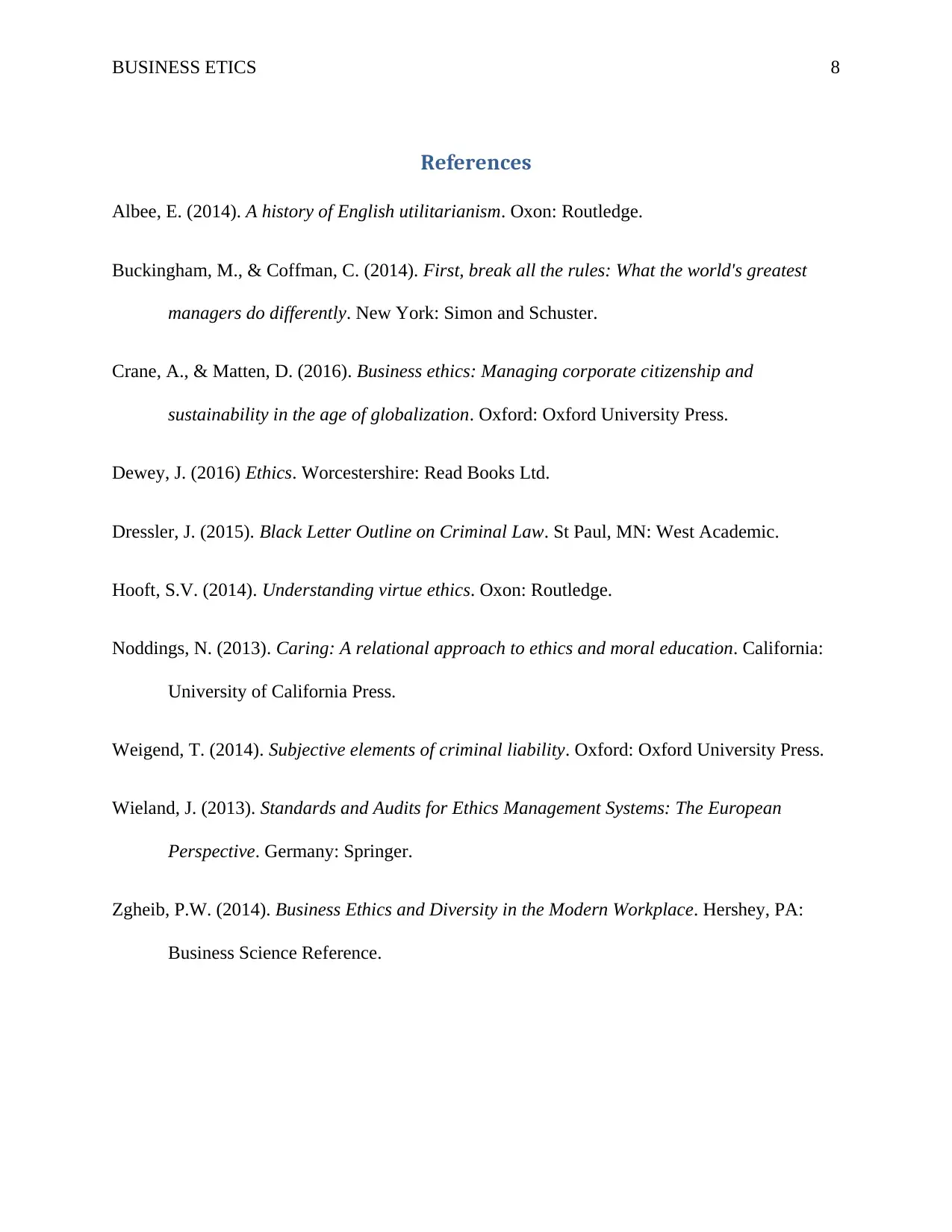
BUSINESS ETICS 8
References
Albee, E. (2014). A history of English utilitarianism. Oxon: Routledge.
Buckingham, M., & Coffman, C. (2014). First, break all the rules: What the world's greatest
managers do differently. New York: Simon and Schuster.
Crane, A., & Matten, D. (2016). Business ethics: Managing corporate citizenship and
sustainability in the age of globalization. Oxford: Oxford University Press.
Dewey, J. (2016) Ethics. Worcestershire: Read Books Ltd.
Dressler, J. (2015). Black Letter Outline on Criminal Law. St Paul, MN: West Academic.
Hooft, S.V. (2014). Understanding virtue ethics. Oxon: Routledge.
Noddings, N. (2013). Caring: A relational approach to ethics and moral education. California:
University of California Press.
Weigend, T. (2014). Subjective elements of criminal liability. Oxford: Oxford University Press.
Wieland, J. (2013). Standards and Audits for Ethics Management Systems: The European
Perspective. Germany: Springer.
Zgheib, P.W. (2014). Business Ethics and Diversity in the Modern Workplace. Hershey, PA:
Business Science Reference.
References
Albee, E. (2014). A history of English utilitarianism. Oxon: Routledge.
Buckingham, M., & Coffman, C. (2014). First, break all the rules: What the world's greatest
managers do differently. New York: Simon and Schuster.
Crane, A., & Matten, D. (2016). Business ethics: Managing corporate citizenship and
sustainability in the age of globalization. Oxford: Oxford University Press.
Dewey, J. (2016) Ethics. Worcestershire: Read Books Ltd.
Dressler, J. (2015). Black Letter Outline on Criminal Law. St Paul, MN: West Academic.
Hooft, S.V. (2014). Understanding virtue ethics. Oxon: Routledge.
Noddings, N. (2013). Caring: A relational approach to ethics and moral education. California:
University of California Press.
Weigend, T. (2014). Subjective elements of criminal liability. Oxford: Oxford University Press.
Wieland, J. (2013). Standards and Audits for Ethics Management Systems: The European
Perspective. Germany: Springer.
Zgheib, P.W. (2014). Business Ethics and Diversity in the Modern Workplace. Hershey, PA:
Business Science Reference.
1 out of 8
Your All-in-One AI-Powered Toolkit for Academic Success.
+13062052269
info@desklib.com
Available 24*7 on WhatsApp / Email
![[object Object]](/_next/static/media/star-bottom.7253800d.svg)
Unlock your academic potential
Copyright © 2020–2025 A2Z Services. All Rights Reserved. Developed and managed by ZUCOL.


